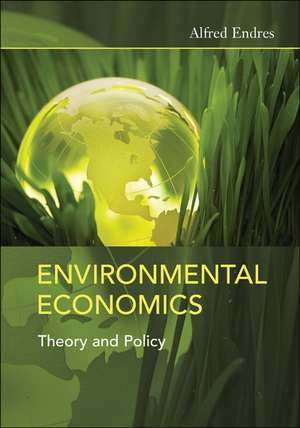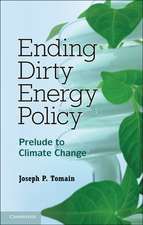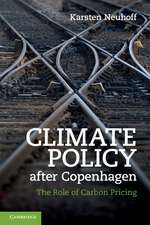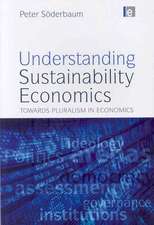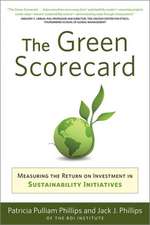Environmental Economics: Theory and Policy
Autor Alfred Endres Traducere de Iain L. Fraseren Limba Engleză Paperback – 5 dec 2010
| Toate formatele și edițiile | Preț | Express |
|---|---|---|
| Paperback (1) | 471.28 lei 6-8 săpt. | |
| Cambridge University Press – 5 dec 2010 | 471.28 lei 6-8 săpt. | |
| Hardback (1) | 1141.55 lei 6-8 săpt. | |
| Cambridge University Press – 5 dec 2010 | 1141.55 lei 6-8 săpt. |
Preț: 471.28 lei
Preț vechi: 529.54 lei
-11% Nou
Puncte Express: 707
Preț estimativ în valută:
90.20€ • 92.96$ • 76.15£
90.20€ • 92.96$ • 76.15£
Carte tipărită la comandă
Livrare economică 03-17 martie
Preluare comenzi: 021 569.72.76
Specificații
ISBN-13: 9780521173926
ISBN-10: 0521173922
Pagini: 400
Ilustrații: 55 b/w illus. 4 tables
Dimensiuni: 178 x 255 x 22 mm
Greutate: 0.68 kg
Ediția:REV & Extended
Editura: Cambridge University Press
Colecția Cambridge University Press
Locul publicării:New York, United States
ISBN-10: 0521173922
Pagini: 400
Ilustrații: 55 b/w illus. 4 tables
Dimensiuni: 178 x 255 x 22 mm
Greutate: 0.68 kg
Ediția:REV & Extended
Editura: Cambridge University Press
Colecția Cambridge University Press
Locul publicării:New York, United States
Cuprins
Part I. The Internalization of Externalities as Central Theme of Environmental Policy: 1. Foundations; 2. Implications of making the concept of internalization programmatic in environment policy; Part II. Strategies for Internalizing Externalities: 3. Negotiations; 4. Environmental liability law; 5. Pigovian tax; Part III. Standard-Oriented Instruments of Environmental Policy: 6. Introduction; 7. Types of environmental policy instruments; 8. Assessment of environmental policy instruments; Part IV. Extensions of the Basic Environmental-Economics Model: 9. Environmental policy with pollutant interactions; 10. Environmental policy with imperfect competition; 11. Internalization negotiations with asymmetrical information; 12. The 'double dividend' of the green tax; 13. The induction of advances in environmental technology through environment policy; Part V. International Environmental Problems: 14. Introduction; 15. International environmental agreements; 16. Instruments of international environmental policy - the example of the EU's emissions trading; 17. Epilogue: the vision of a federal US emission trading system; Part VI. Natural Resources and Sustainable Development: 18. Resource exhaustion - the end of mankind?; 19. Renewable resources; 20. Sustainable development; Epilogue: three types of externality and the increasing difficulty of internalizing them.
Recenzii
'Professor Endres invites the reader to look deeply into the microeconomic underpinnings of environmental economics, and not merely accept concepts as established wisdom without close scrutiny. Students will appreciate the author's humorous, even playful treatment of the microeconomics of environmental policy choices.' Robert T. Deacon, University of California, Santa Barbara
'In Environmental Economics Alfred Endres provides a brilliant overview of available instruments and mechanisms of environmental policy and critically discusses those from an economic perspective. A must for everyone interested in increasing the efficiency and effectiveness of environmental policy instruments!' Michael G. Faure, University of Maastricht and Erasmus University Rotterdam, the Netherlands
'This unique textbook, based on basic economic theory, not only opens the door to the research frontiers of environmental economics, but also guides us to the field of environmental policy applications. Readers will surely be excited by studying how an economic theory can be applied to an analysis of institutional policy tools for environmental protection, such as property rights or liability rules.' Eiji Hosoda, Keio University, Japan
'This elegantly written book on environmental economics not only summarizes existing knowledge, but also provides a fresh look at the subject with new interpretations. Many exercises and examples of European, U.S., and international policy issues illustrate the value of theory and make the policy debate come alive. Alfred Endres's style of presentation makes reading enjoyable and fun, not only for students and scholars in economics but for those in other disciplines as well.' Michael Finus, University of Exeter
'This is a wonderful textbook, combining the fundamentals of environmental economics with recent theoretical research, and applying it to the analysis of American and European environmental policy.' Nadezda Pakhomova, St Petersburg State University
'This textbook offers students with basic knowledge of (micro) economics a deep understanding of basic and topical environmental issues and research results in an easily digestible format. The nontechnical yet sound presentation of methodology and theoretical principles, the discussion of solution concepts, and applications to practical problems are in perfect balance. The author succeeds in conveying his profound knowledge and insights in a stimulating way garnished with a pinch of humor.' Rüdiger Pethig, University of Siegen
'In this textbook Alfred Endres uses microeconomic methods to investigate environmental policy and pollution. It is a brilliantly written book, in which the latest theoretical and empirical research is considered. I recommend it to anyone who is interested in these environmental questions.' Friedrich Schneider, Johannes Kepler University of Linz
'In Environmental Economics Alfred Endres provides a brilliant overview of available instruments and mechanisms of environmental policy and critically discusses those from an economic perspective. A must for everyone interested in increasing the efficiency and effectiveness of environmental policy instruments!' Michael G. Faure, University of Maastricht and Erasmus University Rotterdam, the Netherlands
'This unique textbook, based on basic economic theory, not only opens the door to the research frontiers of environmental economics, but also guides us to the field of environmental policy applications. Readers will surely be excited by studying how an economic theory can be applied to an analysis of institutional policy tools for environmental protection, such as property rights or liability rules.' Eiji Hosoda, Keio University, Japan
'This elegantly written book on environmental economics not only summarizes existing knowledge, but also provides a fresh look at the subject with new interpretations. Many exercises and examples of European, U.S., and international policy issues illustrate the value of theory and make the policy debate come alive. Alfred Endres's style of presentation makes reading enjoyable and fun, not only for students and scholars in economics but for those in other disciplines as well.' Michael Finus, University of Exeter
'This is a wonderful textbook, combining the fundamentals of environmental economics with recent theoretical research, and applying it to the analysis of American and European environmental policy.' Nadezda Pakhomova, St Petersburg State University
'This textbook offers students with basic knowledge of (micro) economics a deep understanding of basic and topical environmental issues and research results in an easily digestible format. The nontechnical yet sound presentation of methodology and theoretical principles, the discussion of solution concepts, and applications to practical problems are in perfect balance. The author succeeds in conveying his profound knowledge and insights in a stimulating way garnished with a pinch of humor.' Rüdiger Pethig, University of Siegen
'In this textbook Alfred Endres uses microeconomic methods to investigate environmental policy and pollution. It is a brilliantly written book, in which the latest theoretical and empirical research is considered. I recommend it to anyone who is interested in these environmental questions.' Friedrich Schneider, Johannes Kepler University of Linz
Notă biografică
Descriere
This intermediate-level undergraduate textbook in environmental economics builds on the microeconomics courses students take in their first year.
